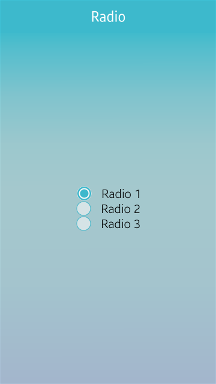Radio
The radio UI component displays 1 or more options and allows users to select 1 of them. For more information, see the Radio API.
This feature is optional.
Basic Usage
To use a radio component in your application:
-
Add a radio button with the
elm_radio_add()function:Evas_Object *radio; radio = elm_radio_add(parent); -
Set a text or an image, if necessary, according to the default style:
-
Set a label to the radio button with the
elm_object_text_set()function, if the style supports a text part:elm_object_text_set(radio, "option 1"); -
Set an image object to the button with the
elm_object_part_content_set()function and pass the part name as a parameter:Evas_Object *icon; elm_object_part_content_set(radio, "icon", icon);
-
-
Group the radio buttons:
-
Assign a unique value to each radio button with the
elm_radio_state_value_set()function:elm_radio_state_value_set(radio, 1); -
Group the radio buttons with the
elm_radio_group_add()function. You can set one of the radio buttons as selected with theelm_radio_value_set()function.elm_radio_group_add(radio, group); -
Group the radio buttons visually by packing them into a box.
-
-
Register the callback functions.
The following example shows how to define and register a callback for the
changedsignal:evas_object_smart_callback_add(radio, "changed", changed_cb, data); void changed_cb(void *data, Evas_Object *obj, void *event_info) { dlog_print(DLOG_INFO, LOG_TAG, "The value has changed\n"); }
The following example shows a simple use case of the radio component.
Example: Radio use case

Evas_Object *win;
Evas_Object *conf;
Evas_Object *nf;
Evas_Object *box;
Evas_Object *radio;
Evas_Object *group;
/* Starting right after the basic EFL UI Layout code */
/* win - conformant - naviframe */
box = elm_box_add(nf);
evas_object_show(box);
elm_naviframe_item_push(nf, "Radio", NULL, NULL, box, NULL);
/* Radio 1 */
/* Add a radio */
radio = elm_radio_add(box);
/* Configure the radio */
elm_object_text_set(radio, "Radio 1");
elm_radio_state_value_set(radio, 1);
evas_object_show(radio);
elm_box_pack_end(box, radio);
group = radio;
/* Radio 2 */
radio = elm_radio_add(box);
elm_object_text_set(radio, "Radio 2");
elm_radio_state_value_set(radio, 2);
evas_object_show(radio);
elm_box_pack_end(box, radio);
/* Add to the group */
elm_radio_group_add(radio, group);
/* Radio 3 */
radio = elm_radio_add(box);
elm_object_text_set(radio, "Radio 3");
elm_radio_state_value_set(radio, 3);
evas_object_show(radio);
elm_box_pack_end(box, radio);
elm_radio_group_add(radio, group);
/* Set 1 of the radio components as selected */
elm_radio_value_set(group, 1);
Styles
The following table lists the available component styles.
Table: Radio styles
| Style | Sample | Text part | Swallow part |
|---|---|---|---|
default |
 |
elm.text |
icon |
Callbacks
You can register callback functions connected to the following signals for a radio object.
Table: Radio callback signals
| Callback | Description | event_info |
|---|---|---|
changed |
The radio button is selected. | NULL |
Note
The signal list in the API reference can be more extensive, but only the above signals are actually supported in Tizen.
Note
Except as noted, this content is licensed under LGPLv2.1+.
Related Information
- Dependencies
- Since Tizen 2.4